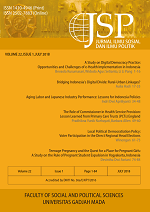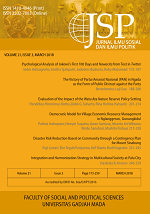Health System Resilience and Community Participation amidst the Covid 19 Pandemic: A Case Study of SONJO (Sambatan Jogja) in the Special Region of Yogyakarta, Indonesia
Ganjar Widhiyoga(1*), Nuri Ikawati(2)
(1) Department of International Relations, Universitas Slamet Riyadi, Surakarta, Indonesia
(2) Institute for Demographic and Poverty Studies (IDEAS), Jl. Legoso Raya No. 25, Tangerang Selatan, Indonesia
(*) Corresponding Author
Abstract
There is a growing concern over how the Covid-19 pandemic might affect low- and medium- income countries (LMOCs) worse compared to high-income countries. The main contributor to this aggravation is the health system is not strong enough to sustain the shock the system caused by the pandemic. Therefore, strengthening the health system resilience in LMOCs is imperative to lessen the gap between countries. The health system resilience constitutes a set of capabilities to maintain shocks, adapt to the shock and transform into actions to keep the essential functions of the health system. The essential factor contributing to the resilience of a health system is the recognition of the complexity and dynamic power relationship underlying the system, including opening access for community participation. This study aims to describe how SONJO, a community-based organization in the Special Region of Yogyakarta (SRY), Indonesia, has played a crucial role in strengthening the health system resilience in the province during the Covid-19 pandemic 2021. As the nature of the research, this study conducts a qualitative approach to collect and analyze the data. The study shows that SONJO can develop adaptive mechanisms to cope with the outbreak through the collective action of diverse actors in the health system translated from shared knowledge, coordination, and values. SONJO acts as a social broker that bridges a wide range of actors in the health system of SRY through a digital platform.
Keywords
Full Text:
PDFReferences
Abimbola, S., & Topp, S. M. (2018). Adaptation with robustness: The case for clarity on the use of 'resilience' in health systems and global health. BMJ Global Health, 3(1), 1–3. https://doi.org/10.1136/ bmjgh-2018-000758
Anwar, H. Z., Yustiningrum, R. R. E., Andriana, N., Kusumawardhani, D. T. P., Sagala, S., & Sari, A. M. (2017). Measuring Community Resilience to Natural Hazards: Case Study of Yogyakarta Province. In R. Djalante, M. Garschangen, F. Thomalla, & R. Shaw (Eds.), Disaster Risk Reduction. Disaster Risk Reduction in Indonesia: Progress, Challenges, and Issues (pp. 609–634). Springer.
Apriasari, H. (2021). Konsep Harmoni antara Manusia, Alam dan Tuhan sebagai Sebuah Kearifan Lokal dalam Menghadapi Bencana bagi Masyarakat Jawa. Jurnal Manajemen Bencana, 7(2), 133-140. http:// jurnalprodi.idu.ac.id/index.php/MB/ article/view/770
Bao, Y., Quan, C., Wang, L [Lijuan], & Ren, F. (2014). The role of pre-processing in twitter sentiment analysis. In D. Huang, K. H. Jo, & L. Wang (Eds.), Intelligent Computing Methodologies. ICIC 2014. Lecture Notes in Computer Science (pp. 615–624). Springer. https://doi.org/10.1007/978-3-319-09339-0_62
Barasa, E. W., Cloete, K., & Gilson, L. (2017). From bouncing back, to nurturing emergence: Reframing the concept of resilience in health systems strengthening. Health Policy and Planning, 32(1), iii91-iii94. https://doi.org/10.1093/heapol/czx118
Barker, K. M ., L ing, E. J., Fallah, M ., Vandebogert, B., Kodl, Y., Macauley, R. J., Viswanath, K., & Kruk, M. E. (2020). Communit y eng ag ement for healt h system resilience: Evidence from Liberia's Ebola epidemic. Health Policy and Planning,35(4), 416–423. https://doi.org/10.1093/heapol/czz174
Bhandari, S., & Alonge, O. (2020). Measuring the resilience of health systems in low- and middle-income countries: A focus on community resilience. Health Research Policy and Systems, 18(1), 1–19. https://doi. org/10.1186/s12961-020-00594-w
Blanchet, K., Nam, S. L., Ramalingam, B., & Pozo-Martin, F. (2017). Governance and capacity to manage resilience of health systems: Towards a new conceptual framework. International Journal of Health Policy and Management, 6(8), 431–435. https://doi.org/10.15171/ijhpm.2017.36
Bowen, J. R. (1986). On the Political Construction of Tradition: Gotong Royong in Indonesia. The Journal of Asian Studies, 45(3), 545–561. https://doi.org/10.2307/2056530
Burnham, P. (2008). Research Methods in Politics (2nd ed). Political analysis . Palgrave Macmillan.
CNN Indonesia (2020, March 2). Jokowi Umumkan Dua WNI Positif Corona di Indonesia. CNN Indonesia. https://www.cnnindonesia.com/nasional/20200302111534-20-479660/jokowi-umumkan-dua-wni-positif-corona-di-indonesia
Creswell, J. W., & Poth, C. N. (2018). Qualitative Inquiry and Research Design: Choosing among five approaches (Fourth edition).
Denzin, N. K., & Lincoln, Y. S. (Eds.). (2018).The SAGE handbook of qualitative research (Fifth edition). Sage Publications.
Djalante, R., Lassa, J., Setiamarga, D., Sudjatma, A., Indrawan, M., Haryanto, B., Mahfud, C., Sinapoy, M. S., Djalante, S., Rafliana, I., Gunawan, L. A., Surtiari, G. A. K., & Warsilah, H. (2020). Review and analysis of current responses to COVID-19 in Indonesia: Period of January to March 2020. Progress in Disaster Science, 6, 1–9. https://doi.org/10.1016/j. pdisas.2020.100091
Haldane, V., Ong, S. E., Chuah, F. L. H., & Legido-Quigley, H. (2017). Health systems resilience: meaningful construct or catchphrase? The Lancet, 389(10078), 1513. https://doi.org/10.1016/S0140- 6736(17)30946-7
Hamid, N., Royyani, M. A., Muhajarah, K., & Aly, M. N. (2021). “Sambatan”: A Form of Community’s Local Wisdom in Facing the Threat of Abrasion in Kragan, Rembang, Indonesia. 6th International Conference on Science, Education and Technology (ISET 2020), 613–617. https://doi.org/10.2991/assehr.k.211125.115
Handoyo, B., & Susilawati, N. (2021). Eksistensi Tradisi Samb at an dan Ing on pada Masyarakat Petani Jawa. Culture & Society: Journal of Anthropological Research, 3(1), 50–61. https://doi.org/10.24036/csjar.v3i1.92
Hanefeld, J., Mayhew, S., Legido-Quigley, H., Martineau, F., Karanikolos, M., Blanchet, K., Liverani, M., Yei Mokuwa, E., McKay, G., & Balabanova, D. (2018). Towards an understanding of resilience: Responding to health systems shocks. Health Policy and Planning, 33(3), 355–367. https://doi.org/10.1093/heapol/czx183
Hermann, M. G. (2008). Content Analysis. In A. Klotz & D. Prakash (Eds.), Research methods series. Qualitative methods in international relations (pp. 151–167). Palgrave Macmillan.
Hizbaron, D. R., Ruslanjari, D., & Mardiatno, D. (2021). Amidstcovid-19 pandemic: An adaptive disaster governance in Yogyakarta, Indonesia. Social Sciences, 10 (3), 1–18. https://doi.org/10.3390/ socsci10030092
Hookway, N., & Snee, H. (2008). The Blogosphere. In N. Fielding, R. Lee, & G. Blank (Eds.), The SAGE Handbook of Online Research Methods (pp. 381–398). Sage Publications, Ltd.
Kieny, M. P., & Dovlo, D. (2015). Beyond Ebola: A new agenda for resilient health systems. The Lancet, 385(9963), 91–92. https://doi. org/10.1016/S0140-6736(14)62479-X
Kothari, C. (2004). Research Methodology: Methods and Techniques. New Age International.
Kruk, M. E., Ling, E. J., Bitton, A., Cammett, M., Cavanaugh, K., Chopra, M., El-Jardali, F., Macauley, R. J., Muraguri, M. K., Konuma, S., Marten, R., Martineau, F., Myers, M., Rasanathan, K., Ruelas, E., Soucat, A., Sugihantono, A., & Warnken, H. (2017). Building resilient health systems: A proposal for a resilience index. BMJ (Online), 357, 1–8. https://doi.org/10.1136/ bmj.j2323
Kruk, M. E., Myers, M., Varpilah, S. T., & Dahn, B. T. (2015). What is a resilient health system? Lessons from Ebola. The Lancet, 385(9980), 1910–1912. https://doi. org/10.1016/S0140-6736(15)60755-3
Kusumasari, B., & Alam, Q. (2012). Local wisdom - based disas ter recov ery model in Indonesia. Disaster Prevention and Management: An International Journal, 21(3), 351–369.https://doi.org/10.1108/09653561211234525
Kutzin, J., & Sparkes, S. P. (2016). Health systems strengthening, universal health coverage, health security and resilience. Bulletin of the World Health Organization, 94(1), 2. https://doi.org/10.2471/BLT.15.165050
Lazuardi, E. (2020). Pandemic and Local Measures: Witnessing Pandemic in Yogyakarta, Indonesia a City with no Lockdown. City and Society, 32(2), 1–17. https://doi.org/10.1111/ciso.12309
Margolis, E., & Zunjarwad, R. (2018). Visual Research. In N. K. Denzin & Y. S. Lincoln (Eds.), The SAGE handbook of qualitative research (pp. 1039–1089). Sage Publications.
Naimoli, J. F., & Saxena, S. (2018). Realizing their potential to become learning organizations to foster health system resilience: Opportunities and challenges for health ministries in low-and middle- income count ries. Health Policy and Planning, 33(10), 1083–1095. https://doi. org/10.1093/heapol/czy100
Nuzzo, J. B., Meyer, D., Snyder, M., Ravi, S. J., Lapascu, A., Souleles, J., Andrada, C. I., & Bishai, D. (2019). What makes health systems resilient against infectious disease outbreaks and natural hazards? Results from a scoping review. BMC Public Health, 19(1), 1–9. https://doi.org/10.1186/s12889-019-7707-z
Oh, T.-H., Dekel, T., Kim, C., Mosseri, I., Freeman, W. T., Rubins tein, M.,& Matusik, W. (2019, May 23). Speech2Face: Learning the Face Behind a Voice. http://arxiv.org/pdf/1905.09773v1
Onuora, C., Torti Obasi, N., Ezeah, G. H., & Gever, V. C. (2021). Effect of dramatized health messages: Modelling predictors of the impact of COVID-19 YouTube animated cartoons on health behaviour of social media users in Nigeria. International Sociology, 36(1), 124–140. https://doi. org/10.1177/0268580920961333
Patterson, A. N. (2017). ‘I need somebody to hear me’: YouTube and identity expression of biracial individuals. Multicultural Education Review, 9(2), 105–116. https:// doi.org/10.1080/2005615X.2017.1313020
Patterson, A. N. (2018). YouTube Generated Video Clips as Qualitative Research Data: One Researcher’s Reflections on the Process. Qualitative Inquiry, 24(10), 759–767. https://doi.org/10.1177/1077800418788107
Reynolds, E. (2011). Enticing a challengeable inarguments. Pragmatics. Quarterly Publication of the International Pragmatics Association (IPrA), 21(3), 411–430. https:// doi.org/10.1075/prag.21.3.06rey
Rudiana, P. A. (2021, January 15). Hospitals in Special Region of Yogyakarta enter emergency state, don't let the health system collapses because of covid-19 (DIY Darurat Rumah Sakit, Jangan Biarkan Jadi Kolaps Gegara COVID). IDN Times. https://jogja. idntimes.com/news/jogja/pito-agustin- rudiana/diy-darurat-rumah-sakit-jangan- biarkan-jadi-kolaps-gegara-covid
Sidik, H. (2021, February 20). Health Dept: Isolation Occupancy in Bantul reached 80% (Dinkes: Keterisian tempat isolasi COVID-19 di Bantul capai 80 persen). Antaranews. https://www.antaranews.com/berita/2010390/dinkes-keterisian- tempat-isolasi-covid-19-di-bantul-capai-80-persen
Siekmans, K., Sohani, S., Boima, T., Koffa, F., Basil, L., & Laaziz, S. (2017). Community- based health care is an essential component of a resilient health system: Evidence from Ebola outbreak in Liberia. BMC Public Health, 17(1), 1–10. https://doi.org/10.1186/ s12889-016-4012-y
SONJO. (2020a). Building Social Capital to Anticipate Long-term Pandemic. Yogyakarta. Retrieved from https://www.youtube. com/watch?v=W7rj1ZetJBQ
SONJO. (2020b ). Covid-19 Con vale sce nt Plasma Donor. Yogyakarta. Retrieved from https://www.youtube.com/ watch?v=Sef6Q8jHjOg
SONJO. (2020c). Living Document SONJO. SONJO. Retrieved from https://sonjo.id/ sonjo/living-document-sonjo/
SONJO. (2020d). SONJO Husada: Maintaining PPE Supply for Frontline Workers . Yogyakarta. Retrieved from https://www. youtube.com/watch?v=2Y2YhD4s9nI
SONJO. (2020e). Strategies to Purchase PPEs during Pandemic. Yogyakarta. Retrieved from https://www.youtube.com/ watch?v=znlD7RjZFyg
SONJO. (2020f ). Synergy for the Future of Health Services. Yogyakarta. Retrieved from https://www.youtube.com/ watch?v=t3PLQjds2Gc
SONJO. (2021a). Funeral Rites during the pandemics: Myths and Realities. Yogyakarta. Retrieved from https://www.youtube. com/watch?v=M3SVVb_5w1E
SONJO. (2021b). Resilient Community - the Last Fortress against Covid-19. Yogyakarta. Retrieved from https://www.youtube. com/watch?v=1ZeIwjW_Aik
SONJO. (2021c). Working Together, Self-Isolation Based on Community Care. Retrieved from https://www.youtube.com/ watch?v=cwrjAs-CCP4&t=3s
Sunartono (2021, June 19). The government of Special Region of Yogyakarta calls for aids on PPEs (Pemda DIY Masih Terbuka Menampung Bantuan APD untuk Penanganan Covid-19). Harian Jogja. Retrieved from https:// jogjapolitan.harianjogja.com/ read/2020/06/19/510/1042256/pemda-diy-masih-terbuka-menampung-bantuan-apd-untuk-penanganan-covid-19
Syambudi, I. (2021, January 15). Covid-19 emergency in Yogyakarta: Collapsed hospitals and rising death rate (Yogyakarta Darurat COVID-19: Rumah Sakit Kolaps, Kematian Melonjak). Tirto. Retrieved from https://tirto.id/yogyakarta-darurat- covid-19-rumah-sakit-kolaps-kematian- melonjak-f9eP
van de Pas, R., Ashour, M., Kapilashrami, A., & Fustukian, S. (2017). Interrogating resilience in health systems development. Health Policy and Planning, 32(September), iii88-iii90. https://doi.org/10.1093/heapol/ czx110
Wulff, K., Donato, D., & Lurie, N. (2015). What is health resilience and how can we build it? Annual Review of Public Health, 36, 361–374. https://doi.org/10.1146/annurev-publhealth-031914-122829
Article Metrics
Refbacks
- There are currently no refbacks.
Copyright (c) 2022 Jurnal Ilmu Sosial dan Ilmu Politik

This work is licensed under a Creative Commons Attribution-NonCommercial-NoDerivatives 4.0 International License.






















